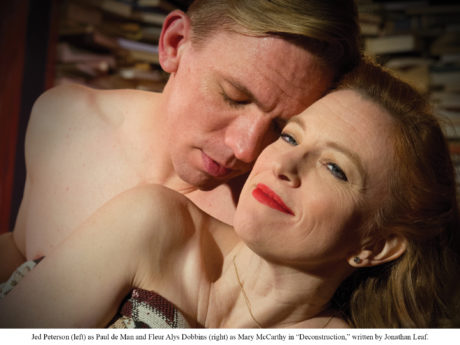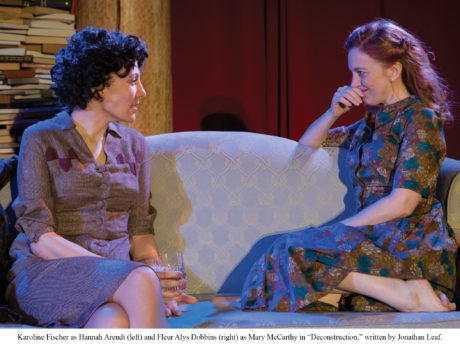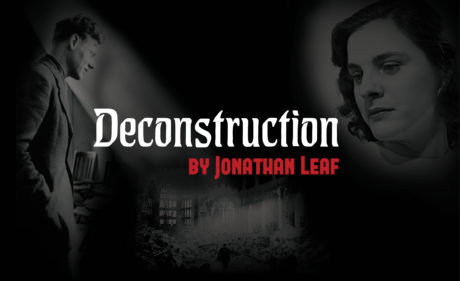“Who are you?” That is the philosophical question and moral issue raised in playwright Jonathan Leaf’s Deconstruction, a world-premiere three-hander (presented in conjunction with Christopher Ekstrom Productions), which opens the 20th-anniversary season of The Storm Theatre Company. Inspired by the alleged affair between real-life American writer and left-wing political activist Mary McCarthy and the younger Belgian-born academic and literary theorist Paul de Man, the fictionalized historical drama, directed by Peter Dobbins, applies the titular methodology to re-examine their rumored relationship, the backgrounds that shaped their personalities and attitudes, and the ethical relativism of both.
Set over a six-month period in 1949, in the aftermath of World War II and the Nazi occupation of Europe, the well-researched play, characterized by lengthy conversations and minimal action, sets the tone of discursive intellectualism that defines the figures: De Man, McCarthy, and fellow scholar and political theorist Hannah Arendt – the German-born Jewish-American pupil, lover, and champion of Martin Heidegger (a seminal German philosopher known for his contributions to both Existentialism and Deconstruction). In their imagined meetings and discussions, the largely unlikeable characters reveal their traumatic backstories, which they use to justify their questionable behavior, through a personal lens. Leaf smartly shows that, despite their distinctive individual demeanors, all three similarly make excuses and adopt the “subjective truth” that is the most advantageous for themselves.

Jed Peterson, affecting a French-Belgian accent as De Man, captures the devious persona of the lying lothario, flattering and seductive in his efforts to extract the support and recommendation of the already established McCarthy for a faculty position at Bard College. His false charm turns to detachment from her once he gets what he wants, then to anger and threats when her friend Arendt exposes the secrets about his past as a suspected embezzler and Nazi-sympathizer (not the Resistance member he claimed to be), along with the new affair he is having with one of his wealthy undergraduate students.
Fleur Alys Dobbins, who lacked fluency with her lines at the performance I attended, brought a puerile sensibility to the married McCarthy, enraptured by beauty, enamored of De Man, and as deceitful with her husband (her third!) as her lover (separated from his own wife and children) is with her. In contrast with McCarthy’s juvenile demeanor, Karoline Fischer’s Arendt is restrained and unemotive, with an understated German accent and a flat affect, dulled by the atrocities of her youth (but, unfortunately, also a bit dull to watch). While she is suspicious of De Man (who, in the story, makes a pass at her while McCarthy is out of the room) and casts a moral eye on his conduct, she herself is involved in an ongoing affair with the married Heidegger, a Nazi loyalist whom she extols and defends.

Shannon Kavanagh’s scenic design makes good use of the actual historic venue of the Grand Hall at St. Mary’s, scattering the space with books, and creating separate areas, with minimal furnishings, at different levels of the stepped stage to suggest the varying locales (McCarthy’s country home in Rhode Island, her Greenwich Village apartment, and De Man’s office at Bard). Dobbins confines his blocking of the actors’ movements accordingly, with each of the play’s six scenes relegated to the appropriate area. Period-style costumes by Jeannipher Pacheco tastefully clothe the academic characters (with the exception of a very obvious wig for Arendt). The times and places in the story are effectively evoked by Michael Abrams’ lighting design, and Alex Santullo creates an aural contrast between the orchestral pomp of Europe and the popular Big Band music of America with his clear sound design.
Deconstruction is an intelligent exploration of the eponymous philosophy through the imagined personal lives of its leading proponents. It will make you question the concepts of absolute truth and objective reality, while considering the human tendency to self-vindication through one’s own subjective perspective.
Running Time: Approximately 75 minutes, with no intermission.
Deconstruction plays through Saturday, March 25, 2017, at Storm Theatre Company, performing at The Theatre at Grand Hall (St. Mary’s Parish) – 440 Grand Street, NYC. For tickets, call (212) 868-4444, or purchase them online.
LINK:
Interview: Playwright Jonathan Leaf Discusses His New Play ‘Deconstruction,’ Playing at the Storm Theatre Company in NYC March 3-25th.





